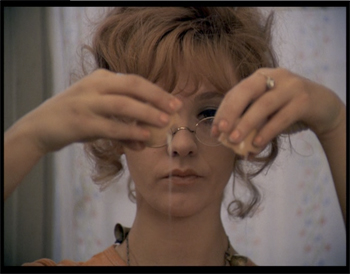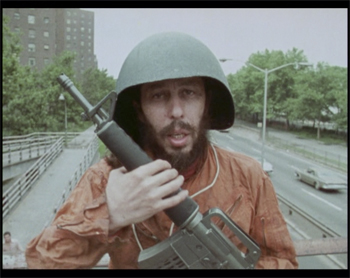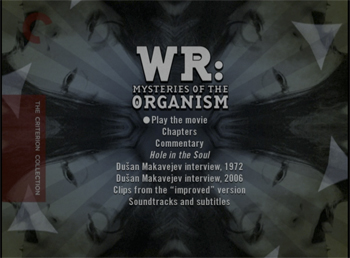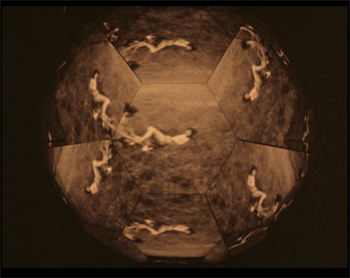| Reviews & Columns |
|
Reviews DVD TV on DVD Blu-ray 4K UHD International DVDs In Theaters Reviews by Studio Video Games Features Collector Series DVDs Easter Egg Database Interviews DVD Talk Radio Feature Articles Columns Anime Talk DVD Savant Horror DVDs The M.O.D. Squad Art House HD Talk Silent DVD
|
DVD Talk Forum |
|
|
| Resources |
|
DVD Price Search Customer Service #'s RCE Info Links |
|
Columns
|
|
|
WR: Mysteries of the Organism - Criterion Collection
THE MOVIE:

Midway into the 1971 Yugoslavian WR: Mysteries of the Organism, I started to wonder if I had been duped. Dusan Makavejev's mind-bending agitprop is a rapid cuisinart of documentary footage and staged political skits. Their basis is the questionable psychological theories of sub-Freudian Wilhelm Reich, whose initials provide the code in the movie's title. Watching the testimony of people who knew the doctor and witnessed his struggles against anti-communist groups and the American government, I started to wonder if this wasn't all a big joke, that it was really a mockumentary, an Eastern European Spinal Tap. I mean, a rogue analyst preaching the power of the human orgasm as a pathway to true, state-sponsored freedom, health, and power? Someone had to be making this up.
Except no one did. Apparently that portion is real, as real as the strange story of the sexually curious Yugoslavian woman is fake. Milena (Milena Dravic) is a young woman enamored of both rhetoric and pleasure, and she spends a lot of time trying to convince her comrades that if they practiced free love, not only would they have a much healthier Yugoslavia, but they'd be acting in line with the original Communist philosophy. I could see that Milena was Reich's teachings put into action--though, it takes her a while to practice free love herself, despite her roommate (Jagoda Kaloper) giving it away all over the place. What I couldn't tell was whether Makavejev intended Milena's situation to be ironic or not. When her fellow Party members break out into pro-Stalinist anthems (often juxtaposed with footage from an actual propaganda film about the dictator), it seems like the director is wryly bursting the Commie bubble, but Milena never wavers. She seems like she means it. (Testament to the strength of Makavejev's actress, really. Dravic's earnestness goes a long way to sell her portions of WR.)
This is just one of the many things that baffled me when trying to piece together the many disparate elements of WR: Mysteries of the Organism. There are clearly two distinct halves to this movie: the material Makavejev shot in America (and in English) is the documentary stuff, and the material shot in Yugoslavia (and in Serbo-Croatian) is the fictional dramatization of the director's theories. Where it starts to get fuzzy is the second U.S. story line, where Makavejev follows a group of libertines in New York city. Interviews with transvestite and Warhol cohort Jackie Curtis seem real enough, but other pieces of the surroundings seem staged, such as the nudists arguing over revolutionary pornography in a publishing office (are they talking about Screw magazine, of all things?). The hippy dressed up as a soldier (Tuli Kupferberg) running around the streets is definitely a contrived stunt, but how connected to the rest is he? Is it Kupferberg that Curtis alleges asked her to marry him? Where exactly is that fourth wall?
Or maybe it doesn't matter. Maybe getting hung up on fact and fiction is just the easiest thing for me to dangle on because, as a whole, WR: Mysteries of the Organism puzzles me. As a formalist experiment, it reminded me a lot of Jean-Luc Godard's Sympathy for the Devil (a.k.a. 1+1) in how it has the duality of the documentary track and the Brechtian political skits. In the Godard film, the documentary elements of the Rolling Stones recording their anthem to cynicism worked, but the pedestrian, pedantic sketches were just annoying interruptions. With WR, I found it to be the opposite. The documentary elements don't really speak to me, and sometimes come off as downright silly. When the hippy soldier jumps up and down like a monkey and strokes his gun, simulating masturbation, I wondered if maybe I had sat on my remote and flipped over to a cable-access channel. It's not the deepest of intellectual connections.
The Yugoslavian story, on the other hand, has much more potential, and maybe could have benefited from standing on its own. As political melodrama, it has a lot to offer, particularly when Milena connects with a Russian figure skater (Ivica Vidovic), the top example of a Stalinist Man (he even shares the dictator's first two names), and tries to convince him of her way of thinking. Cutting away from that to seeing a woman make a plaster casting of a man's penis was too disjointed for me.
Even so, WR: Mysteries of the Organism won the Luis Bunuel Award in Cannes and has survived as a staple of underground cinema. This made me wonder if I delved deeper, maybe I could get what Dusan Makavejev was after. Since this new DVD is part of the Criterion Collection, it's got quite a few special features to go with the movie. I decided for once not to approach these as extras or side elements, but as essential components of this DVD experience. I would use them to try to get to the heart of this movie.

I first turned to the interior booklet that came with the disc, which has a four-page essay by critic Jonathan Rosenbaum. It's a good starting point, as Rosenbaum begins to decipher a lot of what we see on the screen. Beginning with more background on Wilhelm Reich, he draws greater links between Reich's theories and how Makavejev tries to show them in practice through two opposed storytelling styles in two opposed nations. He also identifies more of the players. That was Screw magazine being discussed, and it's that rag's editor, Jim Buckley, having his penis wrapped in plaster. The soldier, Tuli Kupferberg, was a member of the oddball music group the Fugs, and it's his weird folk songs that play over his street scenes, making his actions a sort of performance art.
Even better, Rosenbaum explains a little bit about Makavejev's politics, leading me to think I could be misreading WR: Mysteries of the Organism as overly political. It's not necessarily pro or anti-Communist, but more humanist than that. Reich denied Communist leanings, and even though we have things like Screw in the States, if we persecuted the doctor as we did, how much more free are we?
From the liner notes, I decided to transition to the audio commentary. Here is the true decoder ring to starting to unscramble the message of WR. Read by actor Daniel Stewart, the track is compiled from Raymond Durgnat's book-length examination of the movie. Detailed, incisive, and not always reverent, this approach uses scholarly dialectic, references the script and interviews with Makavejev, and employs historical and critical writings to place WR in its proper context. As Durgnat lays it all out, he reveals a deliberate structure to the film, each move smartly mapped. This exposes the breadth of the juxtapositions of image, information, and story, with Stalin standing tall as the glue that binds it all together, to the good or the bad.
What this lead me to realize is that not only is Makavejev examining political and personal freedom--and really, with the sexual elements, the politics of the personal--but the liberation of ideas by dismantling mis-en-scene and changing how audience and art interact. One may not enjoy it in total, as I certainly didn't, but you will be engaged. Passive viewing is not allowed. This is what makes the whole DVD thing so exciting for film fans, as a well-packaged film can actually give us the tools to get at something that we may not see right away. Viewing WR: Mysteries of the Organism - Criterion Collection twice now, once on my own and once with the help of Durgnat and Rosenbaum, I'm starting to figure it out. It may not be entirely for me, and certainly with this kind of movie, everyone's mileage may vary, but I can't dismiss it outright. Art is sometimes exploration, and as even Columbus would tell you, it often takes a couple of expeditions to find what you're looking for.
(Criterion is also releasing Dusan Makavejev's follow-up film, Sweet Movie. My understanding is that it's an even more difficult movie than WR. Check elsewhere on DVD Talk for our writer's assessment of that DVD.)

THE DVD
Video:
The new high-definition digital transfer of WR: Mysteries of the Organism was overseen by the director, and they couldn't have done a better job with it. Presented in its original 1.33:1 fullscreen ratio, the film is colorful and vibrant, with nary a hint of edge enhancement or surface noise. Really top-notch. (Though, I should note that it is picture boxed, meaning there will be lines on all four sides of your screen when watched on a widescreen monitor. How much this bugs you is up to you.)
Sound:
The multi-language monaural mix is sharp with nice, clear levels. During the Yugoslavian scenes, the subtitles are well written and easy to read. I think sticking to the original mono was a good choice, and I have no complaints about how it turned out.
Extras:
In addition to the accompanying booklet and audio commentary, which I've tackled in my main review, WR: Mysteries of the Organism - Criterion Collection comes with a few more bonus features.
There are two interviews with the director, Dusan Makavejev, one from 1972 and one from 2006. The earlier one is for Danish TV, but Makavejev speaks in English, and though the menu says 1972, the program indicates that it's 1973. In the twenty-eight minute piece, he discusses the greater application of the ideas in WR. The contemporary interview is also just under half an hour, and the talk is conducted by Peter Cowie. It makes for a nice contrast to the older selection, because thirty-five years on, the director has the benefit of reflection and can discuss the life WR has taken on since its initial controversial release.
An amusing bonus five minutes with Makavejev and Cowie deals specifically with a 1992 "improved" version of WR done for the BBC, who wanted the director to help them make the movie suitable for television broadcast. Namely, they couldn't show the penises that were visible in the film. The accompanying clips of the filmmaker's solution are quite funny, as he uses rudimentary digital graphics to call attention to how ridiculous the censorship really is.
The last extra is another production Dusan Makavejev made for the BBC, this time a short film from 1994 called Hole in the Soul. 52 minutes in length, it's a wryly funny, self-narrated autobiography that uses his montage/collage technique to reflect on multiple subjects as his home country of Yugoslavia was being dissolved amidst changes in Eastern Europe. The first-person self-expression suits the director well, and I found it highly enjoyable (though the penultimate scenes with a musician friend of Makavejev could have used some helpful trimming). There is even a clip from WR: Mysteries of the Organism used to illustrate his exile from home after the movie was banned by authorities. We also get to see Milena Dravic in a then-contemporary setting.
FINAL THOUGHTS:
WR: Mysteries of the Organism - Criterion Collection isn't going to be for everyone, and I'm not even sure it's for me. Still, I think it's worth checking out, so Rent It. Dusan Makavejev's 1971 psychedelic mix of documentary and agitprop may leave you scratching your head, or it may blow your mind. As a piece of formalist cinema, it should at least impress you for how it was put together, and the Criterion DVD works well as a complete study tool for getting at the core of meaning in this challenging movie.

Jamie S. Rich is a novelist and comic book writer. He is best known for his collaborations with Joelle Jones, including the hardboiled crime comic book You Have Killed Me, the challenging romance 12 Reasons Why I Love Her, and the 2007 prose novel Have You Seen the Horizon Lately?, for which Jones did the cover. All three were published by Oni Press. His most recent projects include the futuristic romance A Boy and a Girl with Natalie Nourigat; Archer Coe and the Thousand Natural Shocks, a loopy crime tale drawn by Dan Christensen; and the horror miniseries Madame Frankenstein, a collaboration with Megan Levens. Follow Rich's blog at Confessions123.com.
|
| Popular Reviews |
| Sponsored Links |
|
|
| Sponsored Links |
|
|
| Release List | Reviews | Shop | Newsletter | Forum | DVD Giveaways | Blu-Ray | Advertise |
|
Copyright 2024 DVDTalk.com All Rights Reserved. Legal Info, Privacy Policy, Terms of Use,
Manage Preferences,
Your Privacy Choices | |||||||















